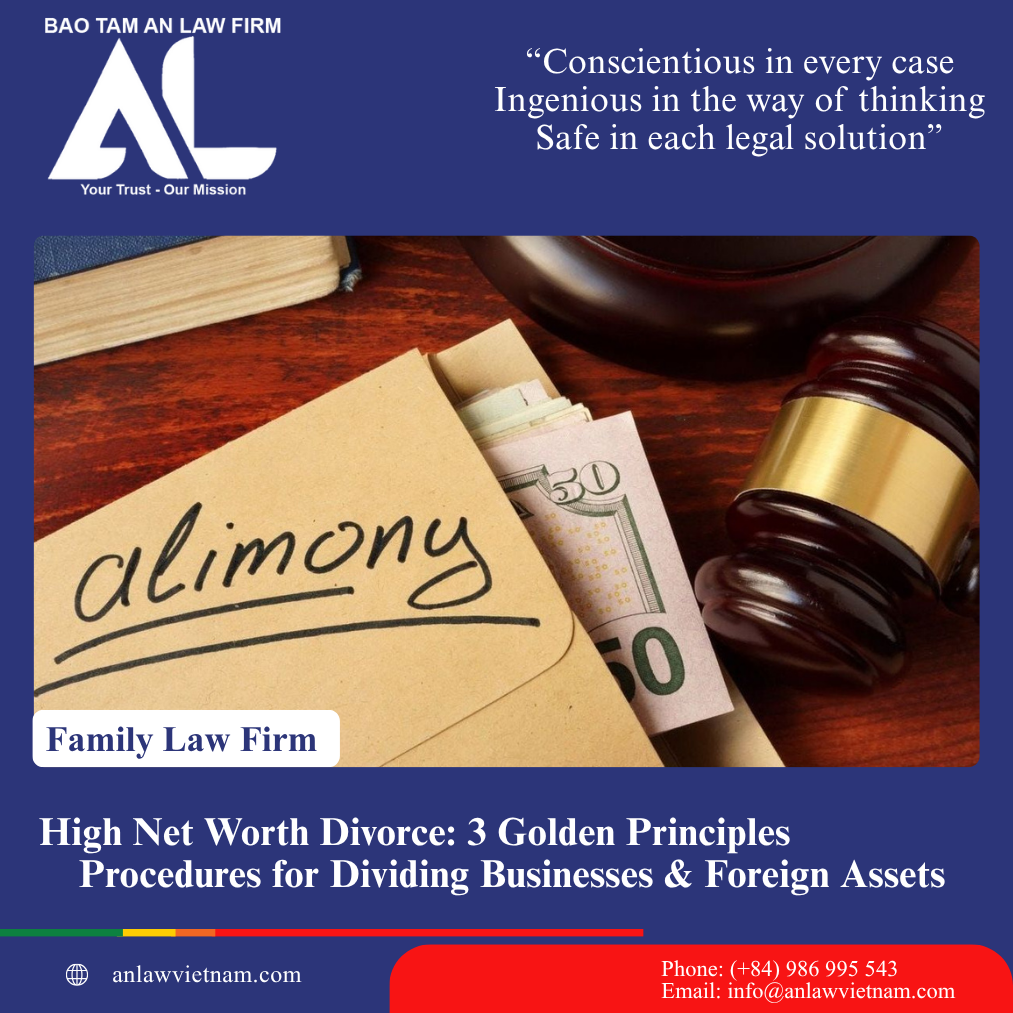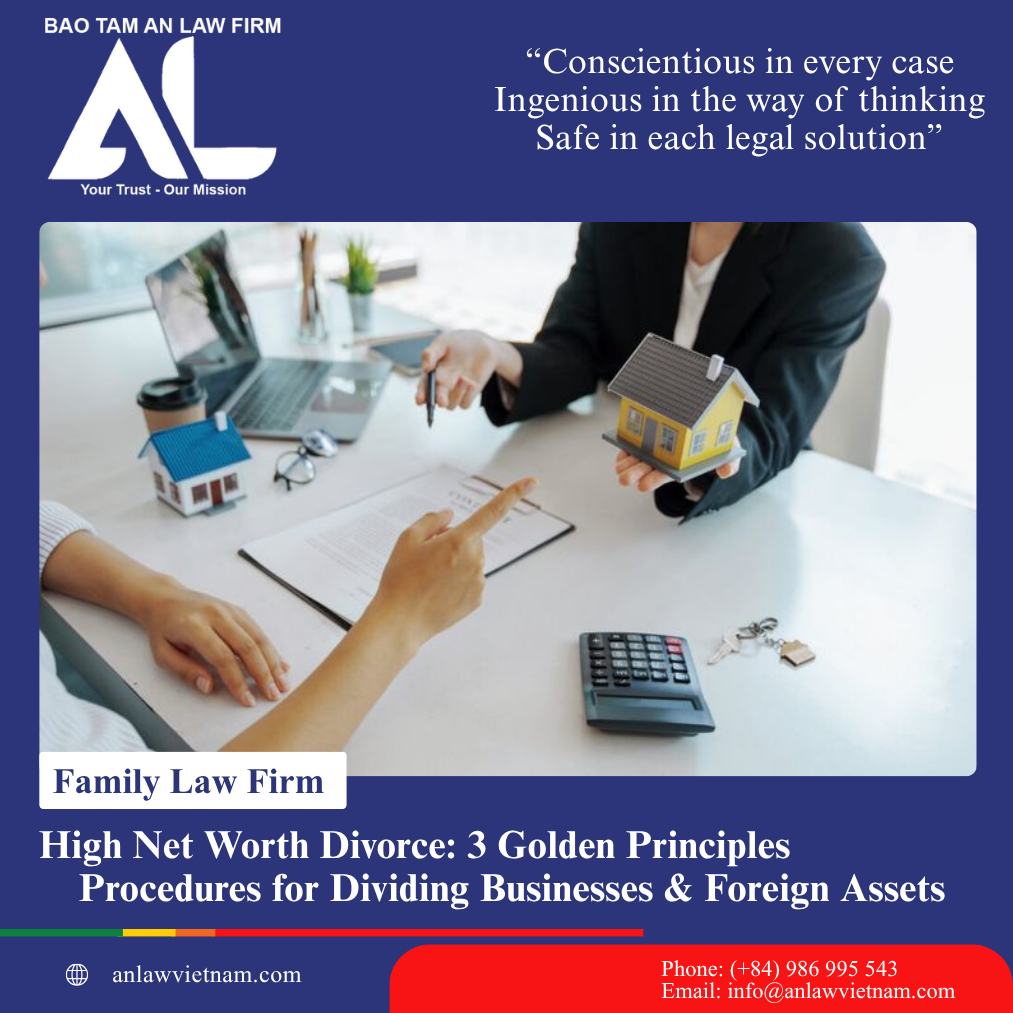High Net Worth (HNW) Divorce: 3 Golden Principles, Procedures for Dividing Businesses & Foreign Assets
The High-Stakes Divorce – Financial Risk and Reputational Damage?
Can divorce expose your banking information and business secrets to the public or media? Does a prenuptial agreement (Prenup) executed overseas hold absolute legal validity in a Vietnamese Court?
When couples with substantial assets (High-Net-Worth – HNW) proceed with divorce, the process is far more than the termination of a marriage; it involves the complex delineation of assets, economic interests, and reputation. These high-value divorces pose a distinct set of legal and financial challenges—from dividing corporate ownership and real estate portfolios to handling foreign assets and ensuring privacy.
Without a suitable legal strategy, these matters can rapidly escalate into protracted, costly, and emotionally damaging disputes.
This article explores the critical legal issues, provides strategies for protecting asset rights, and outlines the procedural considerations that high-net-worth individuals must navigate when divorcing in Vietnam.

Quick Answers: HNW Divorce Principles
The following are direct answers to the most common legal issues concerning the division of high-value assets in Vietnam, frequently raised during client consultations at Family Law Firm – An Law Vietnam:
Issue | Direct Answer |
Criteria for identifying an HNW divorce case? | Typically applied to divorces involving significant assets, complex financial structures (business ownership, multinational real estate), or high-status individuals (business owners, senior executives). |
What is the fundamental principle for asset division? | Marital assets are divided equally, but with consideration given to the contribution of each party, the economic circumstances of the family, and the fault of each party (if any). |
Does a Vietnamese Court divide foreign real estate? | No regarding ownership rights. The Court only divides the monetary value of the asset, but the transfer of ownership must adhere to the laws of the nation where the real estate is located. |
Can separate property be divided in a divorce? | YES. If the separate property was merged into marital assets or if the other party contributed efforts to its development/preservation, it may be treated as joint property. |
3 Golden Principles for Dividing Substantial Assets in Vietnam
Vietnamese law categorizes property into joint property (marital/joint property) and separate property (separate property). Division must adhere to the core principles outlined in the Law on Marriage and Family 2014:
Classification of Joint and Separate Property
- Joint property: Includes assets acquired during the marriage, regardless of whose name the title is held in.
- Separate property: Includes assets owned prior to marriage, inherited, or separately gifted to one spouse.
The challenge for HNW cases is that assets are often commingled (e.g., a business established before marriage but expanded/profitable during the marriage).
The Principle of Equal Division with Consideration for Contribution
Joint marital property is fundamentally divided equally, but the Court will consider the following factors to ensure equity:
- Contribution efforts: Includes direct labor (income) and non-financial contributions (childcare, supporting the other’s career, maintaining the family).
- Circumstances of each party: Assessing the economic condition, health, and earning capacity of each party post-divorce.
- Protection of the legitimate interests of the wife and child: Ensuring the primary custodian receives a reasonable share of assets.
- Fault of each party (if any): In some instances, the Court may consider the fault leading to the divorce as a basis for asset division.
Asset Protection Strategy: Prenuptial and Postnuptial Agreements
Well-drafted prenuptial (prenup) and postnuptial agreements are the most effective tools for risk management. Vietnamese law recognizes these agreements if they are made in writing and duly notarized.
- Requirements for Enforcement: The Court will review the voluntary nature of the agreement, the legality of notarization, and ensure the terms do not violate the rights of children or public policy.
- Foreign Element: Agreements executed overseas must be legally notarized/consular legalized and comply with Vietnamese legal principles to be recognized and enforced.
Complex Asset Division: Businesses and Cross-Border Property
In HNW divorces, assets are frequently corporate holdings, shares, or real estate across multiple jurisdictions, significantly complicating the procedure.
Challenges of Business Valuation and Division
The division of business ownership is highly sensitive. If a business was founded or expanded during the marriage, it may be considered a marital asset.
- Key Challenges: Operational disruption during the valuation process, exposure of confidential business information, and disputes over executive control.
- Solution: Engagement of an independent valuation expert is essential to accurately determine the business’s value at the time of divorce.
- Buyout Agreement: One spouse compensates the other for the equivalent value of their share (the most common solution).
- Business Sale: Selling the business and dividing the proceeds.
Dividing Foreign Assets: Jurisdiction and Applicable Law
When a divorce proceeds in Vietnam involving substantial foreign assets, the Vietnamese Court will rule based on the following principles:
- Jurisdiction: The Vietnamese Court has jurisdiction over the divorce itself and the division of assets located within Vietnam.
- Foreign Assets:
- Real Estate: The division of ownership rights to real estate located overseas must comply with the laws of that foreign country. The Vietnamese Court can only divide the monetary value of this asset.
- Accounts, Shares: Division is based on the agreement between the spouses. If no agreement is reached, the Court will apply Vietnamese law, prioritizing the equal division principle.
Note: Failure to fully disclose all assets (including those abroad) can lead to an unfavorable judgment and negatively affect personal reputation. Collaboration with international financial investigators may be necessary to trace hidden assets.

Related Issues and Post-Divorce Impact
HNW divorces extend beyond property division, affecting reputation and the interests of the children.
Child Custody and Education Issues
Child custody disputes in high-income families often focus on the ability to maintain the standard of living, particularly regarding:
- Access to high-quality international education or private schooling.
- The right to take the child overseas or move their long-term residence.
The Court consistently prioritizes the best interests of the child, assessing each parent’s capacity to meet the child’s emotional, educational, and physical needs.
Spousal Support and Lifestyle
Vietnamese law does not recognize long-term post-divorce spousal support (alimony) as practiced in some Western nations. However:
- The Court may consider the standard of living maintained during the marriage when dividing assets or determining the amount of child support.
- Settlement agreements may include a lump-sum payment or property transfer to ensure fairness, especially if one party withdrew from the workforce to make significant non-financial contributions.
Ensuring Privacy and Reputation Management
Court proceedings in Vietnam are not automatically confidential, posing a risk of public disclosure of financial information or private details, especially for public figures.
- Preventive Measures: Negotiate an out-of-court settlement and embed stringent confidentiality clauses within the final divorce agreement.
- Media Management: Business owners should proactively develop a communication strategy with lawyers and PR experts to minimize reputational damage.
Conclusion: The Necessity of Specialist Legal Counsel
Divorce involving large assets in Vietnam is a high-risk process that requires detailed planning, financial transparency and strategic legal advice. Regular family lawyers may lack the expertise to handle complex financial documents, valuation of specially structured assets or cross-border compliance requirements.
Choosing specialized legal representation ensures assets are protected, risks are managed and all decisions are in line with long-term financial and personal goals.
As a Family Law Firm – An Law Vietnam, we specialize in representing business leaders, high-net-worth individuals and public figures in sensitive and complex divorce cases. We are committed to protecting your assets, reputation and family interests.
For strategic legal advice, risk analysis and protection of your interests in high-net-worth divorces, please contact our Legal Advisors.
Contact Us
📞 Phone: (+84) 986 995 543
📧 Email: info@anlawvietnam.com
📍 Head Office: Diamond Plaza, 34 Le Duan Street, Sai Gon Ward, Ho Chi Minh City
🏢 Vung Tau Branch: Vo Thi Sau Street, Vung Tau Ward, Ho Chi Minh City
Related Articles:
Best Child Custody in Vietnam: 5 Factors That Determine the Decision
High Net Worth (HNW) Divorce: 3 Golden Principles, Procedures for Dividing Businesses & Foreign Assets
Divorce Services For Foreign Nationals In Vietnam
Divorce – Unilateral Divorce – Property Division, Child Custody Rights
The Cost of Divorce with a Foreign Element in Vietnam: A Detailed Guide to Avoiding Unexpected Expenses
Does Vietnam Allow Dual Citizenship? 4 Crucial Exceptions You Need to Know
Reacquisition of Vietnamese Nationality: 6 Mandatory Conditions for Overseas Vietnamese and the Option for Dual Citizenship (2025 Update)
Overseas Vietnamese Inheritance Disputes (Việt Kiều) – Procedures for Estate Declaration, Land Use Right Certificates & Legal Solutions
